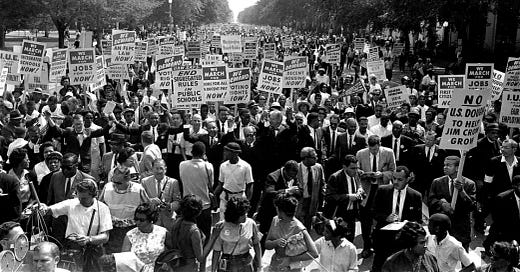American Memory of the Civil Rights Movement
Summary: Our new survey found deep appreciation among Americans for the civil rights movement and broad support for teaching about the movement and its legacy, despite polarized debates about race and the teaching of American history in today’s public discourse.
Over the past two years, US history and social science teachers across the country have faced increasingly relentless scrutiny over the content of their curricula. Much of the scrutiny is directed at teaching the history of race and racism in America. Many have been criticized for indoctrinating students, and anger has risen so high that some teachers have reported receiving death threats.
Our research reveals a path towards resolution. As noted in our previous report, Americans agree that schools should teach the full complexity of our nation’s history, including its history of racism. Relatedly, our new survey shows that Americans across the political spectrum share a deep appreciation for the civil rights movement of the 1950s and 1960s though many still lack a detailed understanding of the era.
This Sunday, August 28th, is the anniversary of the 1963 March on Washington, where Dr. Martin Luther King Jr. delivered his “I Have A Dream” speech. While Americans feel we are far away from the “beautiful symphony of brotherhood” that Dr. King hoped for, they are united in their admiration for the civil rights movement and their belief that it needs to be accurately taught in school.
This newsletter introduces data on American’s perceptions of the country’s history and attitudes on teaching history that is part of a larger report that will be released in the fall.
Most Americans share a deep appreciation for the civil rights movement and believe that it epitomizes American values of freedom and equality.
“During the civil rights era, people were not afraid to fight for a cause and equality. That is still needed today.”
💬 Delbert, Age 18-24, Black male, Passive Liberal, Pennsylvania
“I wish that as a nation we would embrace the desire for equal rights for all people as was felt during the Civil Rights era.”
💬 Dale, Age 65+, White male, Moderate, Missouri
Moreover, Americans want more narratives and perspectives that capture the complexity of the civil rights movement.
“The civil rights era has taught people how to love and how to be equal and righteous in whatever we do. I think it is a lesson for everyone to have, hold, and keep.”
💬 Wilma, Age 55-64, Black female, Traditional Conservative, New Jersey
Our study also finds that, despite positive feelings towards the civil rights movement, most Americans could only name around three historical events or figures from the movement. When asked to list the five most important events or figures of the civil rights movement, Americans are most likely to recall Dr. King’s “I Have A Dream” speech.
However, very few people recalled events where activists encountered resistance and violence. This suggests there are opportunities to deepen our shared understanding of the movement and how it was able to overcome intense opposition and achieve progress that Americans across the political spectrum see as emblematic of our most cherished values.
Recommendations
👉 Historians have shown that anniversaries are powerful in shaping the public’s relationship with history. Schools, museums, media and cultural producers can feature more detailed, complex perspectives of the struggles of activists and protesters throughout the year and not just during Black History Month or on MLK Day. Resources with interactive content (e.g. Interactive Guide to the Civil Rights Movement), personal perspectives (e.g. the oral history online exhibit Voices of Civil Rights), or appeals to specific audiences (e.g. Made By Us) are more likely to engage audiences.
👉 As the generation of civil rights era activists slowly fades, the narrative and collective memory of the era will soon be constructed and contested entirely on historical knowledge. Efforts to expand Americans’ understanding of the era must continue in order to guard against campaigns attempting to distort historical narratives to pull Americans apart. To do this, political leaders and civil society can highlight the shared esteem Americans have for the era and emphasize a story of progress while calling for a renewed effort to learn about the more complex narratives of the movement.
👉 Our research also finds that while most Americans share a common recognition of how significant the civil rights movement was to the country, some are less likely to feel that the movement was significant to them personally. We therefore need to generate creative ways of teaching this history that help Americans discover its personal relevance and impact.




